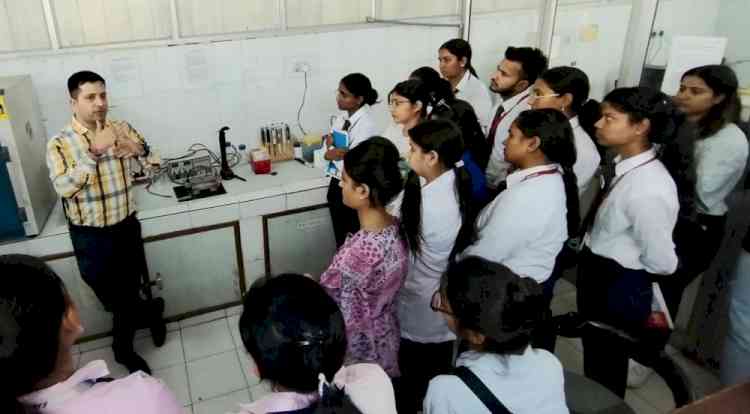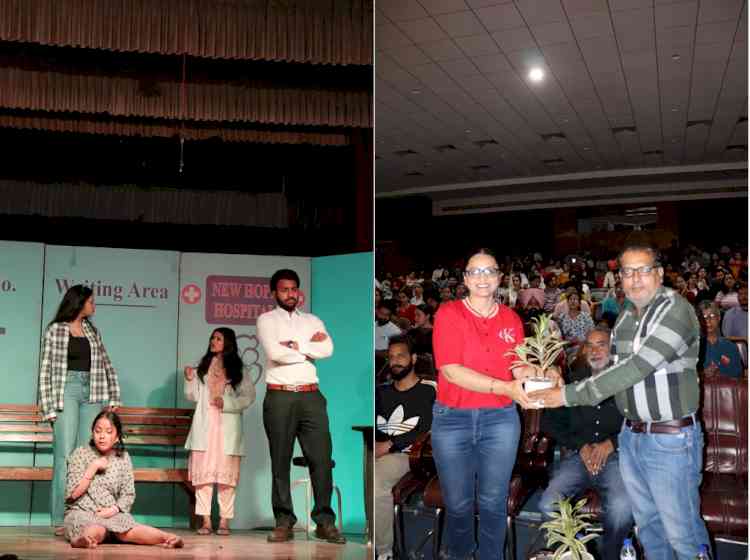Indian and British research experts agree way forward on major problems
Author(s): City Air Newsphoto: city air news Chandigarh, November 8, 2016: A two-day international workshop on sustainable cities and microbial infection concluded today in New Delhi. The workshop, which closed today was jointly organised...


photo: city air news
Chandigarh, November 8, 2016: A two-day international workshop on sustainable cities and microbial infection concluded today in New Delhi.
The workshop, which closed today was jointly organised by the Universities of Birmingham and Panjab University (PU), in collaboration with the University of Nottingham. PU leads a group of institutions around Chandigarh, known as the Chandigarh Region Innovation and Knowledge Cluster (CRIKC).
Experts from Birmingham – one of the world’s top 100 universities – and PU, the leading university in India, met in Chandigarh and Delhi, deliberating and agreeing to lay the foundation for joint research that could help to solve major problems
facing both countries.
Research specialists in the area of sustainable cities from Birmingham and Chandigarh have agreed to work together in helping cities of both countries survive the massive population wave that will hit them in the coming decades.
Similarly, experts in infection and microbiology discussed joint research opportunities that could help tackle issues such as the causes of antimicrobial resistance. India is the world's largest consumer of antibiotics and faces significant problems with such drugs fast losing their power to heal.
India’s Minister of State of External Affairs General Vijay Kumar Singh attended the event’s closing session in Delhi as chief guest. Director General of the Council of Scientific and Industrial Research, Government of India, Dr Girish Sahni; former Delhi University Vice-Chancellor Dr Deepak Pental; former MP Mr Satya Pal Jain; the wife of Union Steel Minister Chaudhary Birender Singh – Mrs Prem Lata; and University of Birmingham Pro-Vice-Chancellor (International) Professor Robin
Mason also attended the function.
Addressing the event, General Vijay Kumar Singh said: “The world is shrinking - universities interacting to share knowledge is no longer a luxury to make the world better, it is a must. If we do not do that, we will be lagging behind in our duty towards humanity.
“I envy the students of today who have opportunities to work together. We must put into effect what we have learned in our universities and create a social impact. I see a great future ahead and hope that the type of co-operation we see
here today exceeds our imagination.”
While appreciating collaboration between UK – Indian institutions, he said that more and more universities around the globe were sharing ideas and working together.
Speaking at the close of the prestigious workshop, University of Birmingham Chancellor Lord Bilimoria of Chelsea said: “The University of Birmingham has a long tradition of engagement with India stretching back over 100 years. I am proud and
delighted to see this tradition continued in the excellent work carried out in partnership with CRIKC over the last two days.
“Research into sustainable cities will be hugely important to both countries and help Indian cities survive the massive population wave that will hit them in the coming decades. Antimicrobial resistance is a problem of profound significance, as
India is the world's largest consumer of antibiotics and faces significant problems with such drugs fast losing their power to heal.
“This partnership reflects the continuing importance of universities in the UK and India working together to progress research and education opportunities between our two countries.”
The Chairperson of CRIKC and PU Vice-Chancellor Professor Arun Kumar Grover expressed happiness that the UK-CRIKC cooperation is moving to the next level. The societies of both countries as well the students and researchers would benefit from closer collaborations between CRIKC and leading British institutions.
Professor Grover recalled that CRIKC was conceived in 2012 to enable individuals and institutions to enhance their performance levels by forging inter-institutional collaboration and sharing the resources and facilities.
Referring to the rich presence of Punjabi diaspora, Professor Grover described UK, Canada and Australia as the natural partners for PU and CRIKC institutions. He said: “The British Council initiative to promote collaboration between CRIKC institutions and UK universities, particularly in the Midlands region, has enabled us to learn best practice at international level.”
Birmingham experts also met UK Minister for Universities & Science Jo Johnson after the workshop to brief him on its highlights.
The workshop followed September’s Punjab-Birmingham Women’s Cancer Genomics Workshop, in New Delhi, where key partners from India and the UK discussed establishing a cohort study to investigate the factors causing the three most common
cancers in women – breast, cervical and ovarian - in the Punjab region.

 cityairnews
cityairnews 
















